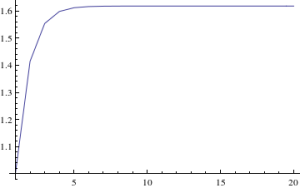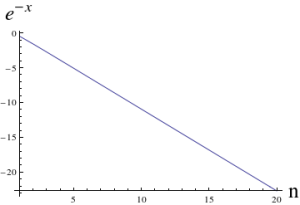Well, we all make errors once in a while, but sometimes they’re more interesting than others. So I inadvertently forgot a square in a calculation and the series suddenly started converging, to the most beautiful of convergences of all: .
So, let’s see how I got the golden ratio to emerge from a broken algorithm.
First, I wrote the recurrence as (remember, I forgot a square out somewhere):
The first few terms of the series:
,
,
,
,
,
,
,…
and if you plot them, you see that they do converge rapidly:
And the value 1.61-ish should be familiar. Could it converge to the golden ratio,
?
Well, numerically it does. Very quickly. The following log-plot shows the error :
Empirically, we are now fairly convinced that the limit of as
goes to infinity is
. Can we show it algebraically? Yes! And, no, it wont be überschmerzlich1.
Let
Let’s square it, and see what happens:
So it’s…
and we find that the unique that satisfies the above equation is
and therefore,
.
1 Superpainful.



[…] with an infinite number of layer, for that, we would need to use another process, maybe like the wild golden ratio of last […]